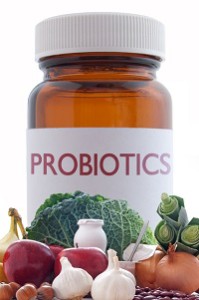Written by Greg Arnold, DC, CSCS. Study participants with metabolic syndrome, who supplemented with 80 milliliters of fermented milk containing B. lactis and B. animalis HNO19, significantly improved BMI, total cholesterol, and LDL cholesterol compared to control.
 Metabolic syndrome affects over 47 million Americans and is characterized by excessive fat tissue in and around the abdomen (called “central obesity”), increased blood pressure (130/85 mmHg or higher), and insulin resistance (the body can’t properly use insulin to control blood sugar) (1). Because metabolic syndrome can incur a yearly cost of $4,000 per year in medications, it has been referred to as “the costliest disease you’ve never heard of” (2).
Metabolic syndrome affects over 47 million Americans and is characterized by excessive fat tissue in and around the abdomen (called “central obesity”), increased blood pressure (130/85 mmHg or higher), and insulin resistance (the body can’t properly use insulin to control blood sugar) (1). Because metabolic syndrome can incur a yearly cost of $4,000 per year in medications, it has been referred to as “the costliest disease you’ve never heard of” (2).
While research has shown green tea to help with cellular health (3) and curcumin may benefit cholesterol/triglyceride levels in those with metabolic syndrome (4), a new study (5) suggests that probiotics may also be a benefit.
The study involved 51 patients (male/female breakdown not provided) aged 18 to 60 with metabolic syndrome. They consumed either 80 milliliters of a fermented milk containing (3.4 x 108) colony-forming units of B. lactis and B. animalis HN019 (26 subjects) or placebo (25 subjects) for 45 days. Blood samples were drawn before and after the study to assess for inflammation and blood sugar control.
After 45 days, the following significant changes were observed in the groups:
| Probiotic | Placebo | p-value | |
|---|---|---|---|
| Body Mass Index (kg/m2) | 4.3% decrease (30.8 to 29.5) | 0.9% decrease (35.8 to 35.5) | 0.017 |
| Total Cholesterol (mg/dL) | 7.2% decrease (209 to 194) | 3% increase (199 to 205) | 0.009 |
| LDL cholesterol (mg/dL) | 13.7% decrease (128.5 to 111) | 1.8% decrease (117 to 115) | 0.008 |
In addition, those in the probiotic group had a significant improvement in inflammation levels, with a 7.5% decrease of the inflammatory protein IL-6 (10.8 to 10 picograms/milliliter, p = 0.044) and a 21.3% decrease of the inflammatory protein TNF-alpha (3.3 to 2.6 pg/mL, p = 0.044) compared to an 18.3% increase (6.0 to 7.1 pg/mL) and 8% decrease (2.5 to 2.3 pg/mL) of IL-6 and TNF-alpha in the control group, respectively.
When suggesting a mechanism related to the ability of probiotics to help elicit these benefits, the researchers pointed to studies showing probiotics to produce an enzyme called hydrolase which activates bile and leads to increased excretion of cholesterol in feces (6). It also increases levels of a fatty acid component such as propionate which can affect an enzyme in the liver and help lower cholesterol levels (7). There was no discussion regarding a mechanism for improving inflammation levels, only that discovering this mechanism “is certainly needed.”
For the researchers, “Data from the present study showed that regular consumption of B. lactis HN019 may contribute to the reduction of the characteristic parameters of metabolic syndrome and obesity.”
Source: Bernini LJ. Beneficial effects of Bifidobacterium lactis on lipid profile and cytokines in patients with metabolic syndrome: A randomized trial. Effects of probiotics on metabolic syndrome. Nutrition 2016 Jun;32(6):716-9. doi: 10.1016/j.nut.2015.11.001. Epub 2015 Dec 7
© 2015 Elsevier Inc. All Rights Reserved
Posted July 19, 2016.
Greg Arnold is a Chiropractic Physician practicing in Hauppauge, NY. You can contact Dr. Arnold directly by emailing him at PitchingDoc@msn.com or visiting his web site at www.PitchingDoc.com.
References:
- American Heart Association Website: “Metabolic Syndrome” posted on the American Heart Association website
- “Metabolic Syndrome: The Costliest Disease You’ve Never Heard Of” – Medical News Today May 9, 2005
- Basu A. Green tea supplementation increases glutathione and plasma antioxidant capacity in adults with the metabolic syndrome Nutr Res. 2013 Mar;33(3):180-7. doi: 10.1016/j.nutres.2012.12.01
- Effects of Extra-Virgin Olive oil and Fish Oil on Lipid Profile and Oxidative Stress in Patients with Metabolic Syndrome. Nutrition 2015; DOI 1016/j.nut.2014.12.016
- Bernini LJ. Beneficial effects of Bifidobacterium lactis on lipid profile and cytokines in patients with metabolic syndrome: A randomized trial. Effects of probiotics on metabolic syndrome. Nutrition 2016 Jun;32(6):716-9. doi: 10.1016/j.nut.2015.11.001. Epub 2015 Dec 7
- Begley M, Hill C, Gahan CG. Bile salt hydrolase activity in probiotics. Appl Environ Microbiol 2006;72:1729–38
- Zhuang G, Liu X-M, Zhang Q-X, Tian F-W, Zhang H, Zhang H-E, et al. Research advances with regards to clinical outcome and potential mechanisms of the cholesterol-lowering effects of probiotics. Clin Lipidology 2012;7:501–7
